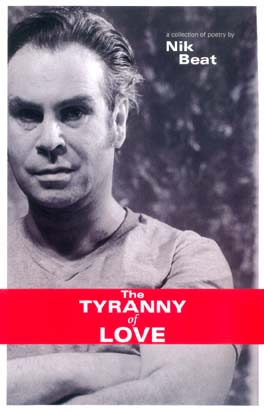
Nik Beat’s collection of poetry, The Tyranny of Love (Seraphim Editions), is the first of a stash I’ll be sampling over the next few weeks. I found this book at The Book Band booth at the Mill Race Folk Festival.
Nik Beat is a Toronto area poet who, among other things, hosts Howl, a radio show on CIUT FM featuring spoken word and music performers.
There is a lot you can infer just from the cover of his book. First, the name: Nik Beat. It’s an inversion of beatnik. It throws the word on its head. He does this a lot. Take his poem, “the hand that cradled the rock”, playing with a familiar expression, (but grafting to it a religious allusion – Peter, the rock).
Nik Beat (both the name & the poet) is funny, too. In “girl with a cigarette”, we imagine a horny guy desperate for the girl in bed beside him. But she goes on and on about environmental issues and causes and whatnot, all the while, filling the room with cigarette smoke – a toxic smog that chokes the guy and makes his eyes water. When she gets up to go to the bathroom, he’s relieved. Or there’s “My Car” which imagines a typical twenty-something car worshiper who, maybe, uses his car to compensate for other shortcomings … auto-eroticism? The poem unfolds like liturgy: “I’m going to drive my car / I’m going to fill up my car / I’m going to wash my car” and so on to the inevitable brainless disaster that forces him to write off his car.
As his moniker suggests (and also his radio show, Howl), Nik Beat has an affinity for the Beat Poets. Some of his poems capture this affinity in their rhythm and the way they play associative games with the words, better suited to performance than paper. See, for example, “Ally on the line” with its tip of the hat to Timothy Leary:
Ally on the line
The phone’s my fix
Sit back relax
Pick up the receiver
Let her voice in
To play its tricksInjecting her voice slowly
Languidly into my brain
Letting it flow sweetly
Through me yet againI’m tuning in
Turning on
I’m going to listen
I’ve Ally to right my wrongs
Ally to conjure me a visionA ghostly voice
Without form or shape
That tells me tales
Of sci-fi horror
And psycho-sexual loreHer mind alights on mine
She’s a Sorry Teller
Ally on the line
With a sensual tenor
The book’s title, The Tyranny of Love, comes from a letter which Byron wrote in 1819 to the countess Teresa Guiccioli. It fits neatly with Nik Beat’s habit of turning things on their head or undermining expectations by inverting an idea. Love is supposed to free us, not enslave us. Instead of the soul leaving the body at death, “the body gets up in disgust and leaves the soul”. “[S]ometimes talk is cheap but actions are cheaper”.
But the phrase, the tyranny of love, points maybe ironically to an underlying formalism in the poems. It’s not just that they allude to Lord Byron and Timothy Leary and the Beat Poets. It’s that they are lit with a persistent concern for religious and spiritual questions, and not in some offhand way, either; these are the questions of an “insider” filled with doubt. Take the first poem, “God without the price”:
i want to love a god without the price
to be ruled by a thin king who casts
a shadow so slender so small
whose universal rain
gently falls
Just five lines into the book we have allusions to both Dietrich Bonhoeffer and Matt. 5:45. In “a struggle with sadism at sunrise”, he imagines Jesus “writhing on wood” and suggests that crucifixion was necessary because “only when it hurts / does one draw a breath of belief / the air is no longer rank and foul with doubt” and concludes by imploring Jesus (?) to “please be silent / for danger / lies in words”. In other poems, we encounter the mind/body problem and the persistence of the soul, beauty, suffering and redemption, the place of women in the old Jehovah-dominated scheme of things (“women argue with Jehovah over property rights”), and ethics, though he doesn’t call it by that name (“god did not fashion you to be a soldier but a soul”).
The result is a provocative mix of pop and pathos.
Update: Nik Beat (aka Michael Barry) died unexpectedly in 2014. See this Now Magazine obituary.